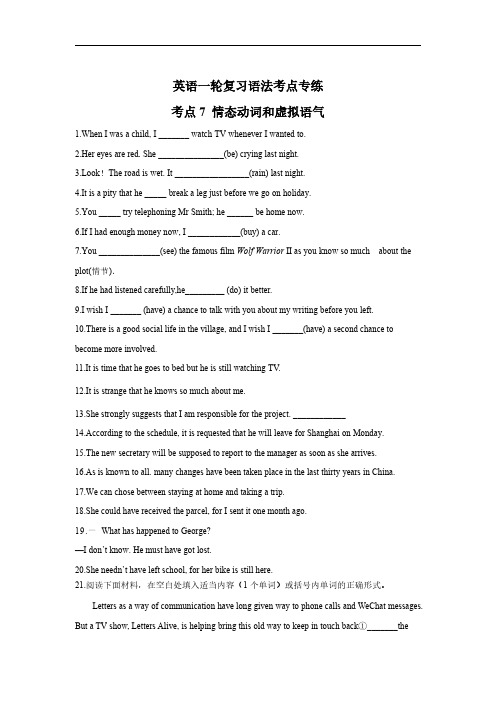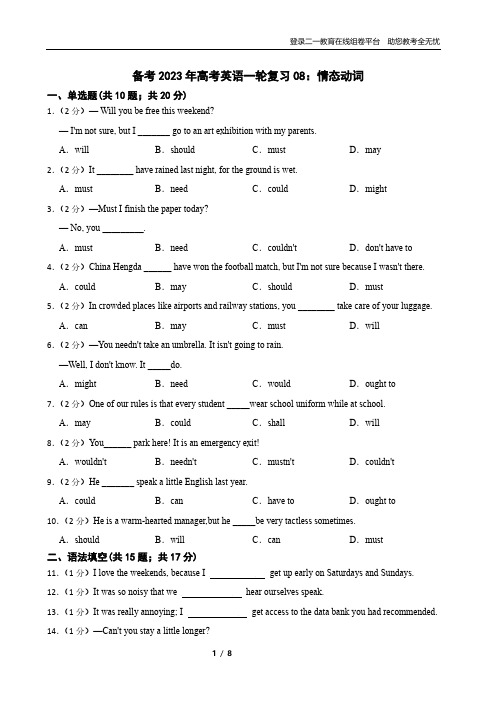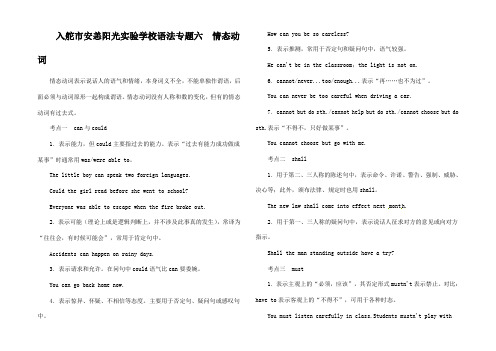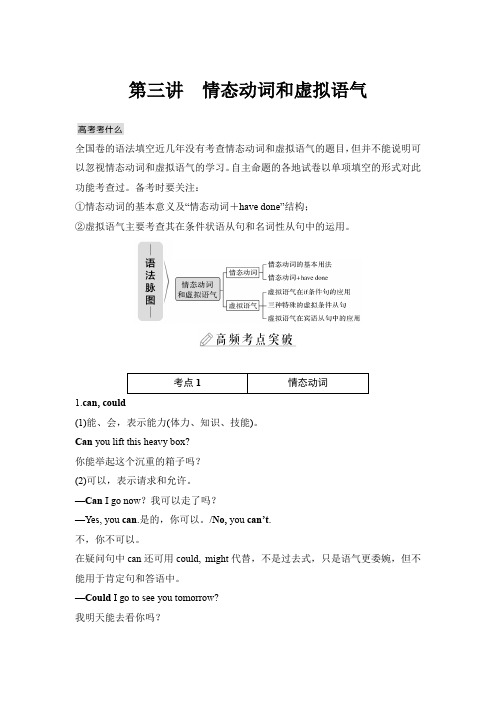高三英语 一轮复习 情态动词
外研版高考英语一轮总复习 语法专题 专题一 第3讲 情态动词和虚拟语气

相反,
考点解读
考点1 情态动词
1.情态动词的基本用法
(1)can和could的用法 用法
例句
No one can be compared with Zhang Ming in playing
表示“能力”。
basketball in our class.
在我们班里,打篮球无人能够与张明相提并论。
表示理论上的可能性, It is usually warm in my hometown in March,but it
We could have faced the difficulty together,but why didn’t you tell me? 我们本来可以一起面对困难,但是你为什么不告诉我? Mark needn’t have hurried.After driving at top speed,he arrived half an hour early. 马克本不必着急。他开快车后,早到了半小时。 Sorry,I’m late.I might have turned off the alarm clock and gone back to sleep again. 对不起,我迟到了。我可能把闹钟关掉后又睡着了。 Look!There are so many mistakes in your composition.You should have fixed full attention on it. 看!你的作文里有这么多的错误。你本应该把所有的注意力都集中在它上 面的。
ck of sleep can
lead to weakened immunity and memory,and also
slow physical growth.
高考英语一轮复习:第二讲-情态动词和虚拟语气省公开课获奖课件市赛课比赛一等奖课件

(3)would 能够表达过去旳习惯性动作,比used to正式, 但没有“现已无此习惯”旳含义。 When we worked in the same firm several years ago, we would often go to the cinema together. 当几年前我们在同一家企业工作时,我们经常一 起去电影院。
1.can 和could旳使用方法 (1)表达“能力”。
— No one can be compared with Yao Ming in playing basketball. — Oh, you are really his big fan.(摘自2023湖南高考) ——在打篮球方面,无人能与姚明相媲美。 ——你真是姚明旳铁杆粉丝。
2.(2023·北京高考)— I don't really like James. Why did
you invite him?
— Don't worry. He ________ come. He said he wasn't
certain what his plans were.
A.must not
Simon's party last night?
— I wanted to, but my mom simply________not
let me out so late at night.
A.could
B.might
C.would
D.should
解析:考察情态动词。 问话人问询为何昨晚没有参 加Simon旳聚会,答话人回答说自己想去,但是妈妈 只是不想让自己在这么晚旳时候出去。 此处表达旳 是过去旳意愿,所以用would。 答案:C
新高考通用版英语一轮复习课件第二部分专题十情态动词和虚拟语气

小时。 述过去的习惯或例行的活
In the past, he would come to help us when he 动,表示"总是,总会"
was free. 过去,他有空时总是来帮我们。
2 My former colleague Nick was helpful, and he _______ give us a hand at work. 解析 句意:我前同事Nick很乐于助人,在工作中经常帮助我们。由语境 及空后的动词原形give可知,此处表示过去经常发生的动作,故填would。
你应该学会尊敬长辈。
I'm sorry that she should be so
表示意外、惊讶、忧虑、 selfish. 我很难过,她竟如此自私。 should
惋惜等情绪,意为"竟然" Why should anyone want to marry
Tony?怎么竟然还有人想和托尼结婚?
表示推测,意为"应该",根 Today is Sunday, and our teacher
【第二部分 语法知识贯通】
专题十 情态动词和虚拟语气
考点帮·必备知识通关 考点1 情态动词 考点2 虚拟语气 考法帮·解题能力提升
考法1 考查情态动词 考法2 考查虚拟语气
考情解读
课标要求 1.考生应掌握 can,could,may,might,must,will,would,shall,should, need等情态动词的基本用法。 2.考生应掌握虚拟语气在非真实条件句、名词性从句及其他句型中 的应用。
情态动词
高中 英语一轮复习语法考点专练 (情态动词和虚拟语气)

英语一轮复习语法考点专练考点7情态动词和虚拟语气1.When I was a child,I_______watch TV whenever I wanted to.2.Her eyes are red.She_______________(be)crying last night.3.Look!The road is wet.It_________________(rain)last night.4.It is a pity that he_____break a leg just before we go on holiday.5.You_____try telephoning Mr Smith;he______be home now.6.If I had enough money now,I____________(buy)a car.7.You______________(see)the famous film Wolf WarriorⅡas you know so much about the plot(情节).8.If he had listened carefully,he_________(do)it better.9.I wish I_______(have)a chance to talk with you about my writing before you left.10.There is a good social life in the village,and I wish I_______(have)a second chance to become more involved.11.It is time that he goes to bed but he is still watching TV.12.It is strange that he knows so much about me.13.She strongly suggests that I am responsible for the project.____________14.According to the schedule,it is requested that he will leave for Shanghai on Monday.15.The new secretary will be supposed to report to the manager as soon as she arrives.16.As is known to all.many changes have been taken place in the last thirty years in China.17.We can chose between staying at home and taking a trip.18.She could have received the parcel,for I sent it one month ago.19.一What has happened to George?—I don’t know.He must have got lost.20.She needn’t have left school,for her bike is still here.21.阅读下面材料,在空白处填入适当内容(1个单词)或括号内单词的正确形式。
高考英语一轮复习精品语法学案 专题8 情态动词和虚拟语气

情态动词主要用来表示说话人的情感、态度等,是中学英语语法的重点,也是高考的热点,是单项填空必考的一个知识点。
情态动词在近五年高考中主要考查四点:情态动词表示推测和可能性的用法;情态动词与虚拟语气;情态动词表达“情感、态度、语气等”;情态动词表示“必要性”等方面的用法。
虚拟语气的考点主要集中在名词性从句、条件句中的用法,以及错综条件句中虚拟语气的应用。
一、情态动词表推测的用法情态动词意义语气句式语境例句备注must 一定可能性最大肯定句对具体事实的判断①A:Look,someone iscoming. Whocan it be? B:It may be ourheadmaster.A: It can’tbe him. Hehas gone toShanghai. B:It must beMr. Wang. Helooks likeour①对现在的行为或状态的推测:must/may/might/can/could+do ②对过去的行为或状态的推测:must/may/might/can/couldhave donemay/might(might可能性小于may)可能可能性较小,尤其might最不肯定肯定句、否定句(可能不)can/could(could可能性小于can)可能疑问句、否定句(不可能)、(could有时也用于肯定句) headmaster.②That may not be true.③Hecouldn't have discovered the truth.有时会肯定句情态动词意义语气句式语境例句备注should/ought to 应该,理应理论上①It's 8 o'clocknow. He should be inthe office now.②Hi, Mum! I'm onthe bus. I should behome in about tenminutes.常表示在一段时间内可能发生的事或某人的期望。
备考2023年高考英语一轮复习08:情态动词

备考2023年高考英语一轮复习08:情态动词一、单选题(共10题;共20分)1.(2分)— Will you be free this weekend?— I'm not sure, but I _______ go to an art exhibition with my parents.A.will B.should C.must D.may2.(2分)It ________ have rained last night, for the ground is wet.A.must B.need C.could D.might3.(2分)—Must I finish the paper today?— No, you _________.A.must B.need C.couldn't D.don't have to 4.(2分)China Hengda ______ have won the football match, but I'm not sure because I wasn't there.A.could B.may C.should D.must5.(2分)In crowded places like airports and railway stations, you ________ take care of your luggage.A.can B.may C.must D.will6.(2分)—You needn't take an umbrella. It isn't going to rain.—Well, I don't know. It _____do.A.might B.need C.would D.ought to7.(2分)One of our rules is that every student _____wear school uniform while at school.A.may B.could C.shall D.will8.(2分)You______ park here! It is an emergency exit!A.wouldn't B.needn't C.mustn't D.couldn't9.(2分)He _______ speak a little English last year.A.could B.can C.have to D.ought to10.(2分)He is a warm-hearted manager,but he _____be very tactless sometimes.A.should B.will C.can D.must二、语法填空(共15题;共17分)11.(1分)I love the weekends, because I get up early on Saturdays and Sundays. 12.(1分)It was so noisy that we hear ourselves speak.13.(1分)It was really annoying; I get access to the data bank you had recommended. 14.(1分)—Can't you stay a little longer?—It's getting late. I really go now. My daughter is home alone.15.(1分)Angry Russians may have (tear) down some statues.16.(1分)A left luggage office is a place where bags be left for a short time, especially at a railway station.17.(1分)I had meant to attend the party, but my mum simply (not) let me out so late at night.18.(1分)you please switch off the radio? The baby is sleeping.19.(1分)The school rules state that no child be allowed out of the school during the day, unless accompanied by an adult.20.(1分)No one be more generous; he has a heart of gold.21.(2分)I go there alone, but he (not) go there by himself.22.(1分)You be Carol. You haven't changed a bit after all these years.23.(1分)His failure in the exam suggested that he (not) have followed the teacher's instructions.24.(1分)I'm glad that you have managed to come, but you (not) have brought wine. We've got plenty.25.(2分)You (not) play with the knife; you hurt yourself.三、选词填空(词汇运用)(共10题;共10分)26.(1分)They (can't/may not) still be out!27.(1分)You(couldn't/might not) smoke on the bus.28.(1分)You (can/might) be right but I'm going back to check the times.29.(1分)You've been working all day. You (could/must) be very tired.30.(1分)My father's birthday is coming. What (shall/may) I give him?31.(1分)Listen, please. You (may not/might not) speak during this exam.32.(1分)With luck, tomorrow (can/could) be a cooler day.33.(1分)I wonder who it is. It (can't/mustn't) be Lisa. She's still in the library now. 34.(1分)Why don't you try on this dress? It (will/can) look nice on you.35.(1分)It's a long time since we met last time. You (might/should) see us more often.答案解析部分1.【答案】D【解析】【分析】句意:——这个周末你有空吗?——我不确定,但我可能会和父母一起去看艺术展。
高考英语一轮复习 语法专题 情态动词

入舵市安恙阳光实验学校语法专题六情态动词情态动词表示说话人的语气和情绪,本身词义不全,不能单独作谓语,后面必须与动词原形一起构成谓语。
情态动词没有人称和数的变化,但有的情态动词有过去式。
考点一can与could1.表示能力,但could主要指过去的能力。
表示“过去有能力成功做成某事”时通常用was/were able to。
The little boy can speak two foreign languages.Could the girl read before she went to school?Everyone was able to escape when the fire broke out.2.表示可能(理论上或是逻辑判断上,并不涉及此事真的发生),常译为“往往会,有时候可能会”,常用于肯定句中。
Accidents can happen on rainy days.3.表示请求和允许。
在问句中could语气比can要委婉。
You can go back home now.4.表示惊异、怀疑、不相信等态度。
主要用于否定句、疑问句或感叹句中。
How can you be so careless?5.表示推测,常用于否定句和疑问句中,语气较强。
He can't be in the classroom;the light is not on.6.cannot/never...too/enough...表示“再……也不为过”。
You can never be too careful when driving a car.7.cannot but do sth./cannot help but do sth./cannot choose but do sth.表示“不得不,只好做某事”。
You cannot choose but go with me.考点二shall1.用于第二、三人称的陈述句中,表示命令、许诺、警告、强制、威胁、决心等;此外,颁布法律、规定时也用shall。
【高考英语一轮复习】第三讲 情态动词和虚拟语气

第三讲情态动词和虚拟语气全国卷的语法填空近几年没有考查情态动词和虚拟语气的题目,但并不能说明可以忽视情态动词和虚拟语气的学习。
自主命题的各地试卷以单项填空的形式对此功能考查过。
备考时要关注:①情态动词的基本意义及“情态动词+have done”结构;②虚拟语气主要考查其在条件状语从句和名词性从句中的运用。
1.can, could(1)能、会,表示能力(体力、知识、技能)。
Can you lift this heavy box?你能举起这个沉重的箱子吗?(2)可以,表示请求和允许。
—Can I go now?我可以走了吗?—Yes, you can.是的,你可以。
/No, you can’t.不,你不可以。
在疑问句中can还可用could, might代替,不是过去式,只是语气更委婉,但不能用于肯定句和答语中。
—Could I go to see you tomorrow?我明天能去看你吗?—Yes, you can.( No, I’m afraid not.)是的,你可以。
(不,恐怕不行。
)(3)可能,表示推测(惊讶、怀疑、不相信的态度),用于疑问句、否定句中。
This can’t be done by him.How can this be true?他不可能这么做。
这怎么可能是真的?2.may, might(1)表示请求和允许。
might比may语气更委婉,而不是过去式。
肯定性应答要用can或may代替could 或might。
否定回答时可用can’t 或mustn’t,表示“不可以,禁止”。
—May/Might I take this book out of the room?我可以把这本书从房间里拿出来吗?—Yes, you can/may.(No, you can’t/mustn’t.)是的,你可以。
(不,你不可以)(2)用于祈使句,表示祝愿。
May you succeed!祝你/您成功!3.will, would(1)表示请求、建议等,would比will更委婉。
- 1、下载文档前请自行甄别文档内容的完整性,平台不提供额外的编辑、内容补充、找答案等附加服务。
- 2、"仅部分预览"的文档,不可在线预览部分如存在完整性等问题,可反馈申请退款(可完整预览的文档不适用该条件!)。
- 3、如文档侵犯您的权益,请联系客服反馈,我们会尽快为您处理(人工客服工作时间:9:00-18:30)。
情态动词(一)学习目标:在以往知识的基础上进一步全面掌握情态动词的相关知识。
一、【知识要点】情态动词就是表示说话的语气或情态的动词。
常见的情态动词有can, may, must, need, dare, shall, will, should, ought to, have to, used to, had better, would rather等。
情态动词具有以下3个特点:(1)情态动词后面接动词原形并与动词原形一起构成谓语。
(2)情态动词虽有时态的变化,但却没有人称和数的变化,即情态动词不会因为主语的人称或单复数的不同而用不同的形式。
(3)变为疑问句或否定句时不需要助动词,而是将情态动词移至主语前变为疑问句,直接在情态动词后加not,构成否定句。
can和could■ 表示能力:能,能够,会He could swim when he was five.Can you drive a car? —Yes, I can. —No, I can’t.■ 表示推测:可能,会。
I think the work can be completed ahead of time.What can he mean?Today is Sunday. He can’t/couldn’t be at school.注意:表示推测时,could不是过去式,只是语气更委婉;若是推测已发生的事或过去的情况,用can/could have加过去分词。
Mike can’t have found his car, for he came to work by bus this morning.You could have started a little earlier.You needn’t have cooked it. We could have eaten it raw.could后接动词的完成式,除表示对过去的推测外,还有以下用法(不用can):①表示过去没有实现的可能性(即某事本来可以发生,却没发生):He could have told her, but he didn’t choose to.I could have lent you the money. Why didn’t you ask me?②用来委婉地责备某人过去应该做某事而没有去做:You could have been a little more considerate.You could ask me before you use my phone.You could have helped me why did you just sit and watch?■ 表示允许:可以(口语中常代替may)You can first lend me one book this time.You can’t take the book out of the room.注意:1. 表示允许别人做某事只能用can,不能用could。
2. can’t 和mustn’t 一样,都可表示“不准,不允许”。
■ 表示请求:可以Can I go swimming today, please, mum?Could you tell me how I can get to the railway station?注意:could不是过去式,只是语气较can更委婉,注意在回答中不可用could。
—Could I have the television on?—Yes, you can. / No, you can’t.【典型例题】1 . -Could I borrow your dictionary?-Yes, of course you___c______A. mightB. willC. canD. should2. A left-luggage office is a place where bags __b____ be left for a short time,especially in a railway station.A. shouldB. canC. mustD. will3. Two eyes _a___see more than one.A.canB.mayC.willD. should4.—Isn’t that Ann’s husband over there?—No, it ___a____ be him I’m sure he doesn’t wear glasses.A. can’tB. must notC. won’tD. may notCan、could与be able to(1) be able to比can有更多的时态。
如:In the past 50 years or so, scientists have been able to “see” farther and farther into the sky.(2) 在表示过去具体某次能够成功做成某事时,只能用was/were able to。
如:He worked very hard and was able to pass that examination.(3)表示将来的能力,通常不用can或could,而用be able to的将来时态:I’ll be able to speak French in another few months.One day people will be able to go to the moon on holiday.但是,若表示现在决定将来是否有能力做某事,则可用can:Can you come to the party tomorrow?【注】could 不用来表示过去特定能力通常只限于肯定句,否定句或疑问句中,它则可以表示过去特定的能力:I managed to find the street, but I couldn’t find her house. (前句为肯定句用managed to,不用could,后句为否定句,可用could)另外,could还可与表示感知的动词(如see, hear, smell, taste, feel, understand 等)连用表示的特定能力:Looking down from the plane, we could see lights on the runway.还有在间接引语中,could也可表示过去特定的能力:He said he could see me next week.【典型例题】1.You should bear in mind that he is not so strong as he__b__.A.was used to beB. used to beC.was used toe to2. An Englishman who _b___not speak Italian was once traveling in Italy.A.mustB.couldC.mayD.mightmay与might■表示请求允许:可以—May/Might/Can I come in?—Yes, please.He said I might borrow his car.注意:前例中的might不是过去式,只是更婉转;但在后例这样主句动词是过去式的句子里,might可看作是may的过去式。
■表示给予允许:可以You may bring it back tomorrow.You may not go there.注意:1. 表示给予允许,不能用might;2. 常用来回答表示不允许。
—Might I go now?—Yes, you may. —No, you mustn’t/can’t. —You’d better not.■表示祝愿May you be happy! May you succeed!!May God bless you! May you live happily.■表示推测:可能It may/might rain this afternoon.He may come, or he may not.2、might 后接动词的完成式,表示过去某事可能发生而实际上却并没发生或表示委婉的批评或责备(此时不用may)。
如:You might have let me know before!A lot of men died who might have been saved.【典型例题】1. Sorry I'm late. I _a_____ have turned off the alarm clock and gone back to sleepagain.A. mightB. shouldC. canD. will2. --- __d___ I go out to play now, Mum?--- No, you _____. You should do your homework first.A. Must; mustn’tB. Must; wouldn’tC. May; needn’tD. May; had better not3.—Is John coming by train?---He should, but he ___d_ not. He likes driving his car.A. mustB. canC. needD. maymay和cancan和may均可表示推测,can用于否定句和疑问句,may用于肯定句和否定式。
两者均可用于否定句,但是含义不同:cannot=不可能,may not=可能不。
比较:It can’t be true. 这不可能是真的。
It may not be true. 这可能不是真的。
若要加强推测的语气,表示较大的可能性,可在may, might后加副词well:You may well be right. 你很可能是对的。
That may well have been their intention.这很可能是他们的意图。
【典型例题】1. He ______ you more help, even though he was very busy.A. might have givenB. might giveC. may have givenD. may give2. A hardworking man ___d__ become a great scientist, but a great scientist _____be a hardworking man.A. can’t; canB. may not; canC. can’t; mustD. may not; must3. You know he is not going to let us leave early if we ____a___ get the work done.A. can'tB. may notC. shouldn't D mustn't4. I can't find the recorder in the room. It _a___ by somebody.A.may have been taken awayB. may leaveC.may take awayD.must have taken awaymust一、must表示“必须”、“一定要”(1)可用于肯定句、否定句或疑问句;用于否定句时,mustn’t 的意思是“一定不要”、“不能”,而不是“不必”:You must finish it today. Must you go so soon?We mustn’t think only of ourselves.(2)对于must 开头一般疑问句,若要作否定回答,可用needn’t,不用mustn’t:"Must I come over tonight?" "No, you needn’t."(3)其后可接被动结构或进行形式:Something must be done to stop it.I think I must be going.二、must表示推测其意为“准是”、“一定是”,注意以下几点:(1)通常只用于肯定句,在否定句或疑问句用can 代之:It must be true. 比较:Can it be true? It can’t be true.(2)后接动词原形,表示对现在情况的推测:He must be wrong. The man must have a lot of money. (3)后接完成式,用来谈论已发生的情况:He must have arrived already.I didn’t hear the phone. I must have been asleep.三、must表示“应当”相当于should, ought to的意思:You must say hello to her.We must go and have a weekend there.四、must 与have to 的区别(1)强调重点不同:两者都表示“必须”,但must 侧重于说话者的主观看法,认为有必要或有义务去做某事;have to则重于客观需要,含有“不得不”或“被迫”之意:We must go at once.If I buy that car, I’ll have to borrow some money.(2)时态形式不同:must 只有现在时一种形式(在宾语从句中可以表示过去),而have to则有多种时态形式:He said (that) she must go with me. She had to go there on foot yesterday.(3)否定式的意义不同:must 的否定式mustn’t 意为“一定不要”、“不允许”;而have to 的否定式don’t have to 意为“不必”(=needn’t)。
